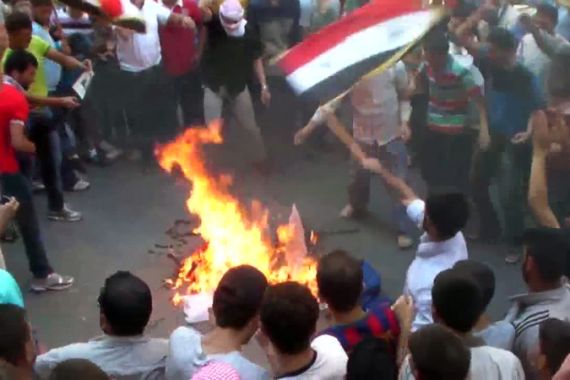Arab League urges Syria to ‘stop bloodshed’
Pressure on Damascus to end violence intensifies, but activists say 23 more people were killed on Tuesday.

Diplomatic pressure on Damascus from the Arab League and Turkey has escalated, although the Syrian regime continued its violent campaign against anti-government protesters.
Activists say that at least 23 people had been killed on Tuesday across Syria. Of that number, at least 19 were civilians, the Local Coordination Committees of Syria, an opposition activist group, reported.
At least fifteen of those killed were shot dead in the town of Kfar Nubouzeh, near the central city of Hama, as snipers from the security forces fired at a funeral for villagers killed the day before, activists said.
Meeting in Cairo on Tuesday, the foreign ministers of the 22-member Arab League called for the Syrian leadership to take urgent steps to halt violence in Syria, where tanks and troops have been sent to quell six months of protests against President Bashar al-Assad’s rule.
“The current situation in Syria is still very serious and an immediate change has to happen in order to stop the bloodshed and prevent people facing more violence,” the Arab League said in a statement.
Youssef Ahmad, Syria’s permanent representative to the Arab League, stressed “Syria’s total rejection” of the statement, considering it “a hostile and non-constructive act in dealing with the crisis in Syria,” Sana, the Syrian state news agency, reported.
‘Civil war’
Recep Tayyip Erdogan, the Turkish prime minister, warned that Syria could plunge into a “civil war” between its Sunni majority and Assad’s minority Alawite sect. Erdogan was in Egypt on the first day of a tour of Arab countries where uprisings have ousted autocratic leaders.
Erdogan expressed frustration with Assad’s regime, with which he had built up close ties, for failing to “listen to the voice of the people”.
“The people’s anger is directed at them [the Alawite elite], not only because they are a tool of the government … and the Syrian regime is playing up this dangerous card,” he said in an interview with Egyptian daily Al-Shorouk.
The Arab League called on Syria to implement the points agreedupon during the visit of Nabil el-Araby, the league’s top official, to Damascus on Saturday. Among the points was an end to violence, release of political prisoners and a clear outline and timetable for a transition to democracy.
The latest United Nations death toll estimates that at least 2,600 people have been killed in Syria since popular protests first broke out in mid-March.
Anger against Russia
On Tuesday, activists in Syria held a “day of anger” against Russia for opposing a Western-led drive for UN sanctions against the Syrian government.
Demonstrators burned Russian flags in the protest hubs of Homs in the centre of Syria and Deraa in the south to protest against Moscow’s support for Assad.
“Do not support the killers,” activists urged Russia in a message announcing Tuesday’s action posted on The Syrian Revolution 2011, a Facebook page that has been a driving force behind the protest movement.
“We express our anger towards Russia and the Russian government. The regime will disappear but the people will live,” the activists wrote.
Moscow has blocked efforts at the UN Security Council to impose more sanctions against Syria and is promoting a rival draft resolution that calls on the government and the opposition to open direct talks.
Dmitry Medvedev, the Russian president, defended the Russian position in talks in Moscow on Monday with David Cameron, the British prime minister, even as the Syrian security forces continued their deadly crackdown on dissent.
Alain Juppe, the French foreign minister, had earlier said that the UN Security Council’s inability to approve a tough resolution against Syria was “a scandal”.
Crackdown continues
Activists said security forces carried out sweeping arrests and raids early on Tuesday. The reports were carried by the London-based Syrian Observatory for Human Rights as well as the Local Co-ordination Committees, both of which have a wide network of sources.
Also on Tuesday, Amnesty International said 95 Syrians have died in government custody since April.
The human rights group also raised concerns about four activists arrested last week near Damascus. The four were picked up soon after the body of their slain friend and fellow activist, Ghaith Mattar, was handed over to his family over the weekend.
Mattar apparently died in custody.
Philip Luther, deputy director of the Middle East and North Africa Programme at Amnesty International, said: “The spiralling total of detainee deaths together with the Syrian authorities’ failure to conduct any independent investigations points to a pattern of systematic, government-sanctioned abuse in which every detainee must be considered at serious risk.”